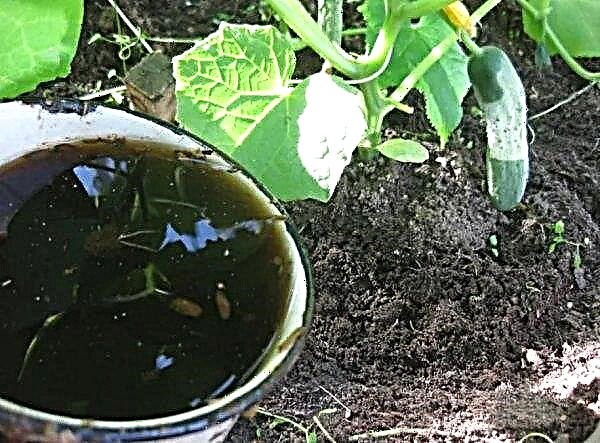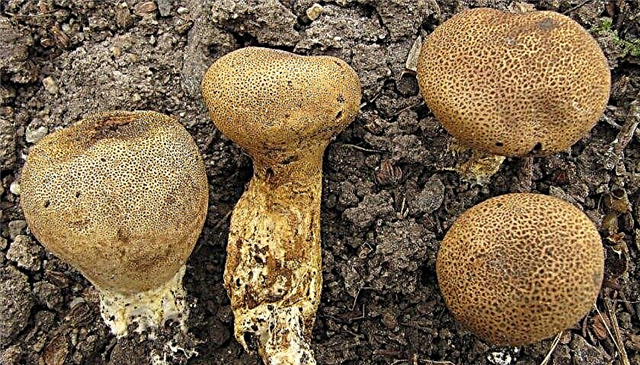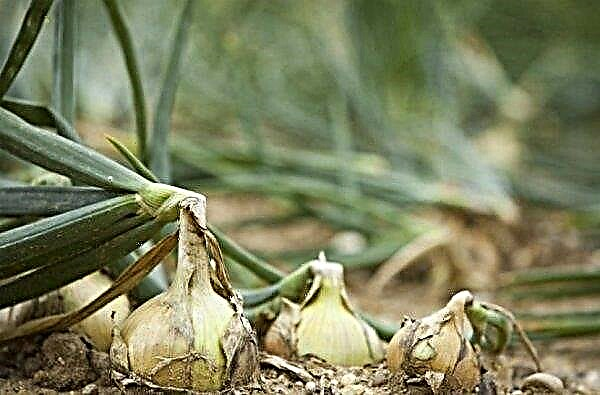Herbs such as parsley, dill, cilantro and basil are widely used in cooking and are loved by us for their expressive piquant taste that can emphasize and complement any dish. It is especially distinguished from the general list of cilantro spices, as it has such a rich taste and smell that it overshadows all other ingredients. In our article, we will consider whether it is possible to eat cilantro to pregnant women, what are its benefits and harms, as well as the rules for taking spices and the rate of its consumption.
Nutritional value and calorie content
Cilantro (or coriander) is an annual herbaceous plant. It is ubiquitous, but the best greenery is cilantro, growing in very sunny regions - these are Asia, the Caucasus, etc. Active use in various fields of human activity is found both in fresh green spice, which we commonly call cilantro, and the seeds of this plant, called coriander.
Did you know? Cilantro was the basis of most diets designed to prevent diseases such as Alzheimer's, Parkinson's, as well as malignant brain tumors.
It is interesting that the initial use of spice in ancient people was reduced exclusively to medicinal purposes, and only over time, cilantro became popular in cooking. The composition of the plant is characterized by the presence of 11 essential oils and several types of organic acids, including ascorbic acid, which helps strengthen immunity. In addition, cilantro is a real storehouse of vitamins and minerals, the highest concentration of which falls on the leaves of the plant. Calorie content of greens per 100 grams of product is only 24 kcal.
In more detail, consider the composition of cilantro below:
- proteins - 2.15 g;
- fats - 0.55 g;
- carbohydrates - 0.90 g;
- water - 93.20 g;
- dietary fiber - 3.1 g.
Vitamins:
- choline - 13.9 mg;
- PP - 1,116 mg;
- K - 312 mcg;
- E - 2.7 mg;
- A - 341 mcg;
- C (ascorbic acid) - 28 mg;
- B9 (folic acid) - 65 mcg;
- B6 (pyridoxine) - 0.151 mg;
- B5 (pantothenic acid) - 0.60 mg;
- B2 (riboflavin) - 0.163 mg;
- B1 (thiamine) - 0.071 mg;
- beta carotene - 3.96 mg.
Important! When dried, the calorie content of the spice increases significantly — up to 217 kcal.
Micro and macro elements:
- zinc - 0.7 mg;
- phosphorus - 50 mg;
- iron - 1.81 mg;
- potassium - 523 mg;
- Manganese - 427 mg;
- sodium - 48 mg;
- calcium - 68 mg;
- magnesium - 27 mg;
- copper - 227 mg;
- selenium - 0.10 mcg.

Useful properties of cilantro during pregnancy
People knew about the healing properties of this spice in ancient times. A huge number of useful and beneficial substances affecting the human body made it possible to use cilantro as a prophylactic against many dangerous ailments. Cilantro has analgesic, diuretic and antioxidant properties. The essential oils contained in the leaves of the plant normalize the functioning of the nervous system, and also play the role of a natural antidepressant, providing a calming and relaxing effect.
- Among the many positive features of cilantro, the following can also be distinguished:
- normalization of the digestive tract, improvement of digestion and intestinal motility;
- strengthening immunity;
- elimination of cholesterol and toxic substances from the body;
- elimination of bleeding gums and caries prevention;
- appetite improvement;
- stabilization of the cardiovascular system, lowering blood pressure;
- normalization of metabolism in the body.
The ability to remove toxic substances from the body makes cilantro an indispensable product for pregnant women. Spice will be especially useful for women living near busy motorways or in a big city. Thanks to one of the primary beneficial properties of greens - the normalization of the digestive system, cilantro can significantly alleviate toxicosis. In the early stages, it is recommended to take decoctions and infusions from the seeds of the plant, which effectively contribute to the elimination of edema. These same drugs that have a beneficial effect on the nervous system will help get rid of seizures. Moreover, cilantro perfectly helps to relieve stress from the kidneys, which during pregnancy especially increases.
In the early stages, it is recommended to take decoctions and infusions from the seeds of the plant, which effectively contribute to the elimination of edema. These same drugs that have a beneficial effect on the nervous system will help get rid of seizures. Moreover, cilantro perfectly helps to relieve stress from the kidneys, which during pregnancy especially increases.
Fresh, vitamin-rich greens can be added in small quantities to various dishes, especially in the spring, when stress is very likely. In late pregnancy, cilantro will serve as an excellent alternative to spices and salt, the consumption of which during this period should be as limited as possible.
Did you know? Seeds of spicy herbs can relieve a hangover — just chew them dry for several minutes. During this time, they will also completely eliminate the characteristic unpleasant odor.
The analgesic, calming and vasodilating effects of the cilantro allow it to be consumed even a few weeks before delivery - most doctors recommend taking 2-3 sprigs of greenery daily.
Admission Rules
Due to the unique composition and versatility in use, cilantro can be safely included in your diet, combining it with various components. In finely chopped form, the spice perfectly complements the first and second courses, and the green seeds used as seasoning can be used in whole or in ground form. Cilantro goes well with the rest of the greens - dill, parsley and basil, so you can flavor them in equal amounts, without fear of too specific taste and smell. Fresh herbs can add a unique flavor to vegetables, fish and meat. A decoction from a medicinal plant, which has choleretic and antiseptic properties, is extremely useful in pregnancy, has proven itself very well. It is prepared according to the following recipe: 30 g of greens are poured into 600 ml of boiling water, after which the broth is allowed to infuse for about an hour and then filtered. Next, the mixture is taken all day in small sips.
Fresh herbs can add a unique flavor to vegetables, fish and meat. A decoction from a medicinal plant, which has choleretic and antiseptic properties, is extremely useful in pregnancy, has proven itself very well. It is prepared according to the following recipe: 30 g of greens are poured into 600 ml of boiling water, after which the broth is allowed to infuse for about an hour and then filtered. Next, the mixture is taken all day in small sips.
Cilantro seeds (coriander) are also in great demand - this product is actively used in the manufacture of fish and meat dishes. However, this is not quite the right way to use coriander, since it should not be cooked because of the risk of losing all its taste. When choosing fragrant herbs, you should pay attention to the ripeness of the seeds, which has a significant impact on the quality of the aroma.
Important! In especially severe cases of cilantro abuse, an allergic reaction can occur that manifests itself in the form of swelling of the nasopharynx and redness of the nasal mucosa and oral cavity.
Unripe coriander has a sharp unpleasant odor, which does not allow its further use for culinary purposes. Unlike fresh herbs, which are suitable for use only in summer, cilantro seeds are much more often used in cooking due to the possibility of pre-harvesting.
Consumption rate for women
When using any product, including cilantro, you should know the measure to avoid poisoning and most other troubles. Pregnant women should be especially careful to include spice in their diet, after consulting with a doctor about its dosage and rate of use. Usually, most of the time cilantro is recommended to be consumed in a very limited amount - not more than 35 g and not every day. This is due to the ability of greenery to provoke the occurrence of blood clots. As for nursing women, many experts even insist on the exclusion of cilantro from the menu due to the high likelihood of allergies and eating disorders in the child.
Usually, most of the time cilantro is recommended to be consumed in a very limited amount - not more than 35 g and not every day. This is due to the ability of greenery to provoke the occurrence of blood clots. As for nursing women, many experts even insist on the exclusion of cilantro from the menu due to the high likelihood of allergies and eating disorders in the child.
Contraindications and possible harm
Along with the healing properties of spicy herbs, there are also contraindications, which must be familiarized with before use. Cilantro can do the most harm only if it is consumed excessively, so you should never forget about the recommended daily intake of the product - 35 grams.
The danger that lies behind an overabundance in the consumption of greenery can be expressed in impaired sleep, brain activity and the monthly cycle in women. For allergy sufferers who add the described spice to a large number of dishes, cilantro can cause skin rashes, and for people suffering from indigestion, both mild and severe intoxication.
It is also recommended to refrain from the use of cilantro for such diseases:
- acute gastritis;
- hypertension;
- diabetes;
- cardiac ischemia;
- thrombosis;
- myocardial infarction;
- thrombophlebitis;
- intolerance to the product.
 Cilantro, which has long been loved by many, is able to decorate and profitably complement any familiar dish, while enriching the body with all the necessary substances. However, in order to prevent a useful spice from becoming a source of danger for a pregnant woman and an unborn baby, one should approach its use with extreme caution and strict dosage.
Cilantro, which has long been loved by many, is able to decorate and profitably complement any familiar dish, while enriching the body with all the necessary substances. However, in order to prevent a useful spice from becoming a source of danger for a pregnant woman and an unborn baby, one should approach its use with extreme caution and strict dosage.












